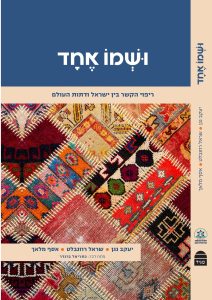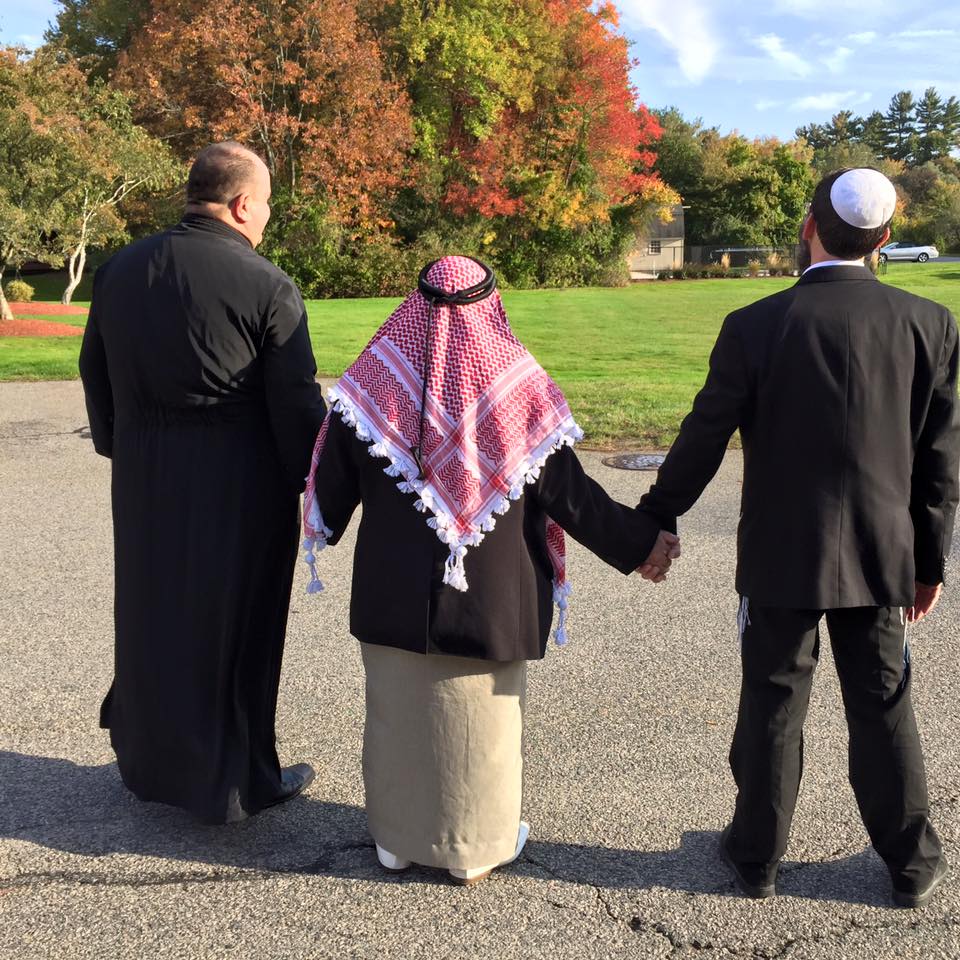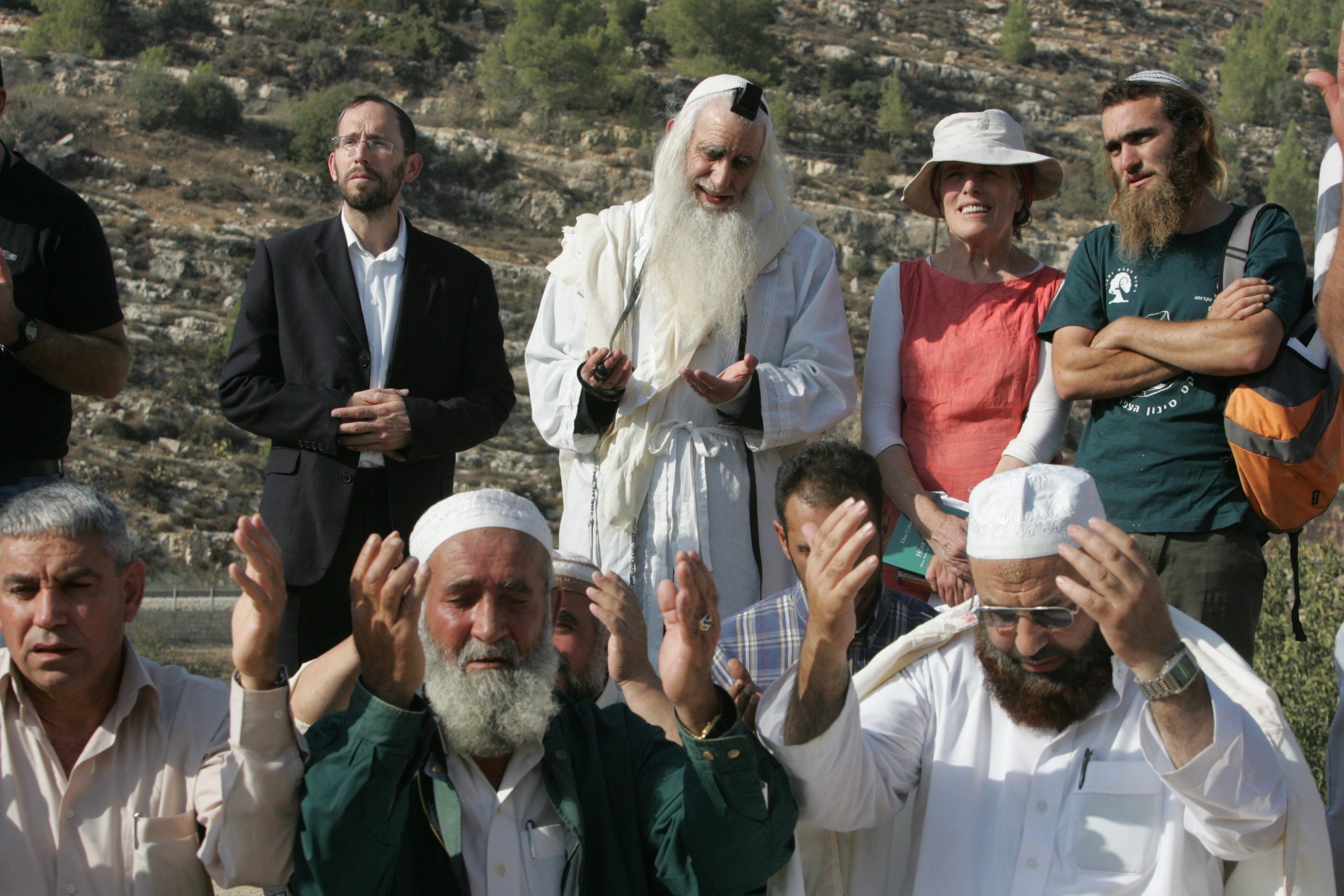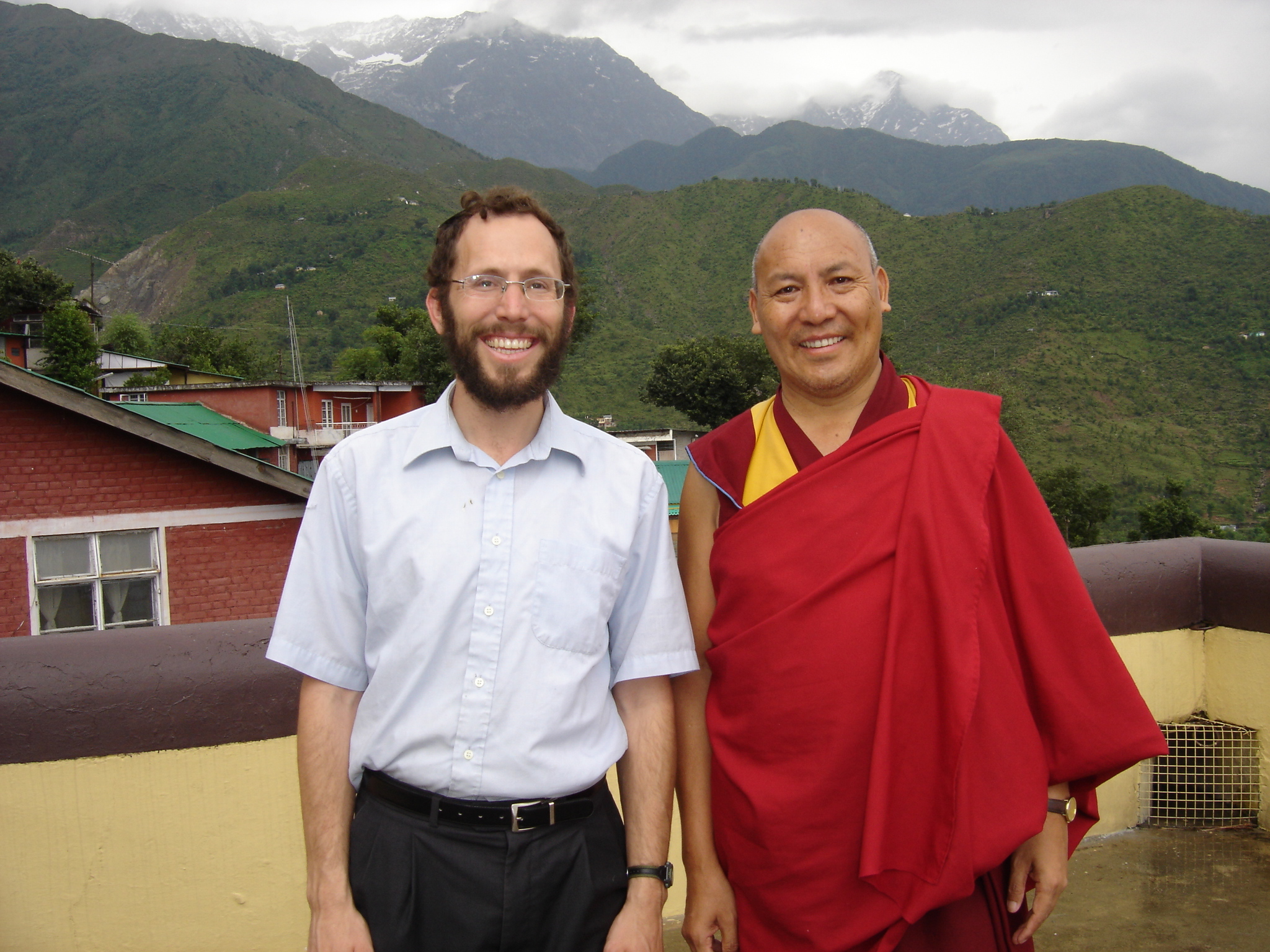
Jews and Arabs Refuse to be Secular
Does Judaism acknowledge the validity of other religions or does it consider them necessarily false and erroneous? The Beit Midrash for Judaism and Humanity analyzes the teachings of the prophets and sages of Israel and offers fascinating insights.
Eyal Vered | May 3, 2023
 Israel is in turmoil, blood is being spilled, brothers and sisters are being murdered on the roads. At a time like this, it may seem futile to engage with the important book before us, one that delves into the relations between Israel and the nations and the role of the various religions. The book’s subtitle speaks to the need for “Healing Judaism’s Relations with World Religions.” In view of the Arab-Muslim violence that is directed towards us, along with the hatred of life and love of murder that causes severe damage to Arab society itself, intensive healing is indeed desperately needed.
Israel is in turmoil, blood is being spilled, brothers and sisters are being murdered on the roads. At a time like this, it may seem futile to engage with the important book before us, one that delves into the relations between Israel and the nations and the role of the various religions. The book’s subtitle speaks to the need for “Healing Judaism’s Relations with World Religions.” In view of the Arab-Muslim violence that is directed towards us, along with the hatred of life and love of murder that causes severe damage to Arab society itself, intensive healing is indeed desperately needed.
Rabbi Kenneth Brander also addresses this tension in his introduction to the book. Although we are surrounded by enemies that must be fought and defeated, it is crucial not to lose sight of the bigger picture, one that goes beyond the current conflict. We must explore the religions themselves to ask whether they constitute progress or a setback in the relations between humanity and its Creator. While religion may be the cause of wars, we must not forget that their genuine purpose, which can and should be just the opposite, is to cultivate faith in God who mandates the sanctity of life.
Rabbi Yaakov Nagen has been at the forefront of the work in this field, and this book is the first fruit of the Beit Midrash for Judaism and Humanity under the auspices of the Ohr Torah Stone Institutions, in collaboration with Dr. Assaf Malach of the Jewish Statesmanship Center and Rabbi Sarel Rosenblatt, Rosh Kollel Torat Yosef at Ohr Torah Stone.
Not unexpectedly, this review will focus primarily on the Muslim aspect of the subject, which is particularly relevant and pressing in the State of Israel.
To begin with, the book opens a wide angle. People tend to address their own concerns first, and thus here we will focus on our struggle with the Palestinians, one that has distinct components relating to religious identity. However, Islam is much broader than that, and a thorough understanding of its tenets, how it can conduct itself and its goals may help establish deep relations of familiarity and peace with the Muslim world in the future, similar to the Abraham Accords.
This approach could have a crucial impact on our ongoing conflict. For years, it has been widely accepted that the key to achieving peace with major Arab countries, such as Saudi Arabia and the Gulf states, must go through Ramallah. However, recent events have challenged this notion. Could it now be possible to isolate the extreme and violent manifestations of Islam in favor of a more moderate approach? Only time will tell, but it is clear that an in-depth understanding of Islam and its teachings could greatly contribute to this possibility.
“So that the world is not left devoid of religion”
The book consists of chapters written by different authors. Each chapter begins with a well-crafted lecture, followed by a comprehensive list of sources, which allows for a thorough examination of the content and the study of the sources on one’s own.
Some of the sources may come as a real surprise to the uninitiated. One example is this quote from Rabbi Yosef Albo’s Sefer Ha-Ikarim:
We shall now inquire whether there must be one divine law for all mankind, or whether there may be more than one. […] It is clear that the temperaments of people are different, either because of the difference of temperament in their ancestors or for some other reasons. […] And it follows from this that the conventions and customs of different lands may be as different as the temperaments of their inhabitants. Thus, one land must have a different law from the other at the same time. For this reason, you will find that the Noahide and the Mosaic laws, though differing in matters of detail, as we shall see, agree in the general matters. […] They both existed at the same time. While Mosaic law existed in Israel, all the other nations had the Noahide law, the difference was due to geographical diversity, the Land of Israel being different from the other lands, and to national diversity, due to differences in ancestry (Sefer Ha-Ikarim, Article 1 Chapter 25).
This is a fascinating concept, one that allows for a dynamic approach to religions that are based on the seven Noahide commandments, further adapted to the temperament and mores of each nation. This fosters a sense of respect, curiosity and a willingness to observe the various ways in which different nations worship the Creator in a manner suitable to them, while still adhering to the fundamental principles of the Noahide laws.
Especially thought-provoking are the words of Rabbi Netanel al-Fayyumi, a prominent Yemenite scholar during the time of Maimonides. He even received a letter from Maimonides himself, who held him in great regard. Rabbi Netanel wrote:
Know my brother that it is entirely possible that the Almighty will sent to His world whomever He wills when he wills. […] And He already sent prophets to the nations before the giving of the Torah, as our late sages said, seven prophets who prophesied to the nations of the world prior to the giving of the Torah, and they are Laban, Jethro, Balaam, Job, Elifaz, Balad and Zafar. And it is entirely possible that He will send to them whoever he wishes after the giving of the Torah so that the world will not be left devoid of religion. And the prophets already said that He will be worshipped from east of the sun to where it sets by all the nations. […] And therefore, it is proper for us to preserve what is already in our hands, and on which we grew up and not oppose anyone from the other religious. […] And thus, it is incumbent upon all nations to behave in accordance with what has come to it and has been given, and follow its prophets and priests and leaders, and then no one will be left without a law.
Rabbi Netanel takes this one step further and allows the emergence of prophecy or prophets among the nations of the world even after the giving of the Torah, all for the sake of this noble goal: “So that the world is not left devoid of religion.” A world without religion is a dangerous, hollow world, one cut off from its roots. One of the most seminal speeches given by a US President was Ronald Reagan’s “Evil Empire Speech,” which he delivered before the National Association of Evangelicals. In it, Reagan explained how he realized that he had to defeat the Soviet Union and why he called it an “evil empire.” The reason he offered is no less than astonishing – because they do not believe in God. A world without faith is a perilous place. To avoid such a hollow and perilous world, Rabbi Netanel suggests the possibility of a prophet being sent to the nations to establish their respective religions.
A living connection with the Creator
The cited sources clearly indicate the that the Almighty may have bestowed different religions upon the various nations tailored to suit their unique nature and actions. It is widely known that Judaism does not have a missionary element. However, the other side of this coin now becomes clear: Judaism refrains from proselytizing because it recognizes that other religions may be suitable for different nations.
This is the case as long as those religions are founded upon the seven Noahide commandments. This raises the question: What are these commandments? And does the fulfillment of these commandments completely satisfy all of God’s demands of his creatures? This is the prevailing approach. According to Maimonides, it is sufficient for a Gentile to fulfill the Seven Noahide Commandments to be rewarded with the world to come. However, the book before us clearly argues that the Seven Noahide Commandments are in fact merely a necessary prelude to the next level that must follow, the level of religion, a more detailed level that includes elements such as prayer and additional commandments tailored to suit the nature of each nation.
The seven commandments given to Noah serve to preserve the most fundamental aspects of human life. Above them, however, is a desire to foster a meaningful relationship with God. This is of course a different approach from that of Maimonides, who called the other religions “errors” and taught that ultimately, all of them would return to the path of truth. Nevertheless, even Maimonides himself acknowledged that Gentiles are permitted to observe additional commandments beyond the seven of Noah, and if they so desire, “they should not be impeded from doing so.”
The universal element of the Torah
The Beit Midrash from which the book before us emanated is but one example of various Jewish movements that have emerged to explore the relationships between Judaism and the religions of the world, as well as the religious worlds of the other nations. These include Rabbi Oury Cherki’s Brit Olam – Noahide World Center; the books and articles by Rabbi Jonathan Sacks, written in a distinctly universal language; Rabbi Yitzchak Ginsburgh’s Fourth Revolution involving Torah study for Gentiles, and more. A growing chorus of voices is advocating for the universal aspect of Judaism, and discussions of our responsibility as Jews towards the religious identity of nations – whether through Torah study by Gentiles, a topic discussed in the book itself – or through our appreciation of their religion, are becoming increasingly widespread.
These voices are increasing in direct proportion to the consolidation and strengthening of the State of Israel and Jewish existence. While this existence is admittedly threatened by various challenges, the very fact of Israel’s success and resilience allows us to raise our eyes and look beyond these difficulties to engage more seriously and profoundly with the universal element in the Torah and our mission toward the rest of the world.
Ohr Torah Stone’s Beit Midrash for Judaism and Humanity is one of the first and most meaningful steps in that direction. Rabbi Yaakov Nagen is the driving force behind this initiative. Driven by love for all those who bear the image of God, Rabbi Yaakov has traversed the globe to forge connections with like-minded religious leaders who share his vision of coming together in the name of God. In some ways, he reminds me of Abraham himself, who called out in the name of God and whose tent was open to the four winds. Rabbi Nagen continues on his idealistic path, which some people consider excessively naive in today’s world.
Rabbi Nagen recently experienced a serious, life-threatening medical crisis, from which he thankfully recovered and is now in good health. Throughout his hospitalization, he received an outpouring of support, well-wishes and prayers from the entire religious world. Prayers were held in synagogues and mosques, led by sheikhs from Israel and the world. “Yesterday, I prayed on the plane for my good friend and dear brother, the distinguished Rabbi Yaakov, for his speedy recovery,” wrote a Muslim cleric with whom Rabbi Nagen has maintained a close relationship for many years. “Allah loves Yaakov. The Prophet Muhammad, peace be upon him, says: ‘When Allah loves his servant, he will call the angel Jibreel and say: Allah loves so-and-so, so love him too, and Jibreel will love him and then declare among the people of heaven: Allah loves so-and-so, so love him too. And the people of heaven will love him, and he will be among those accepted on earth.”
All that is left is to say Amen and to express gratitude for this book, which opens gates and horizons, and for the many initiatives that have followed in its wake.
Rabbi Eyal Vered is the rabbi of the “Yachdav” community in Petach Tikva and is a faculty member of the Institute for Advanced Torah Studies at Bar Ilan University.
Read the original article (in Hebrew) on the Makor Rishon website







